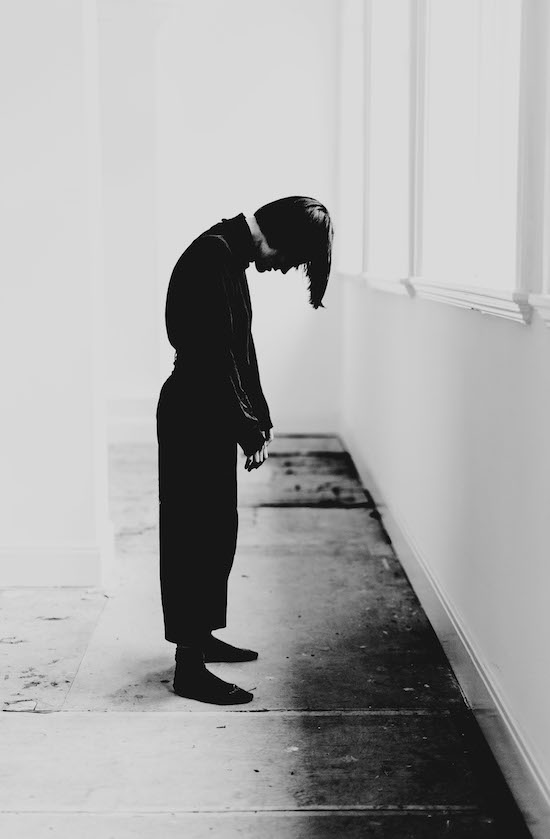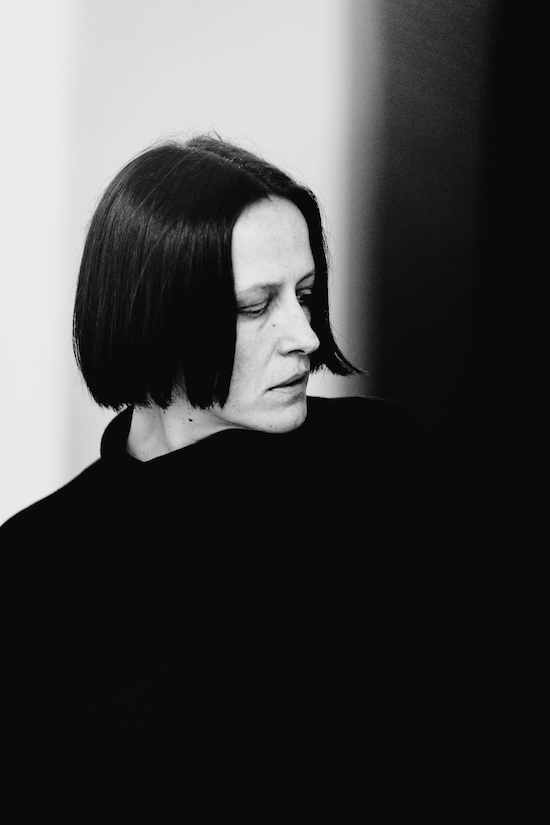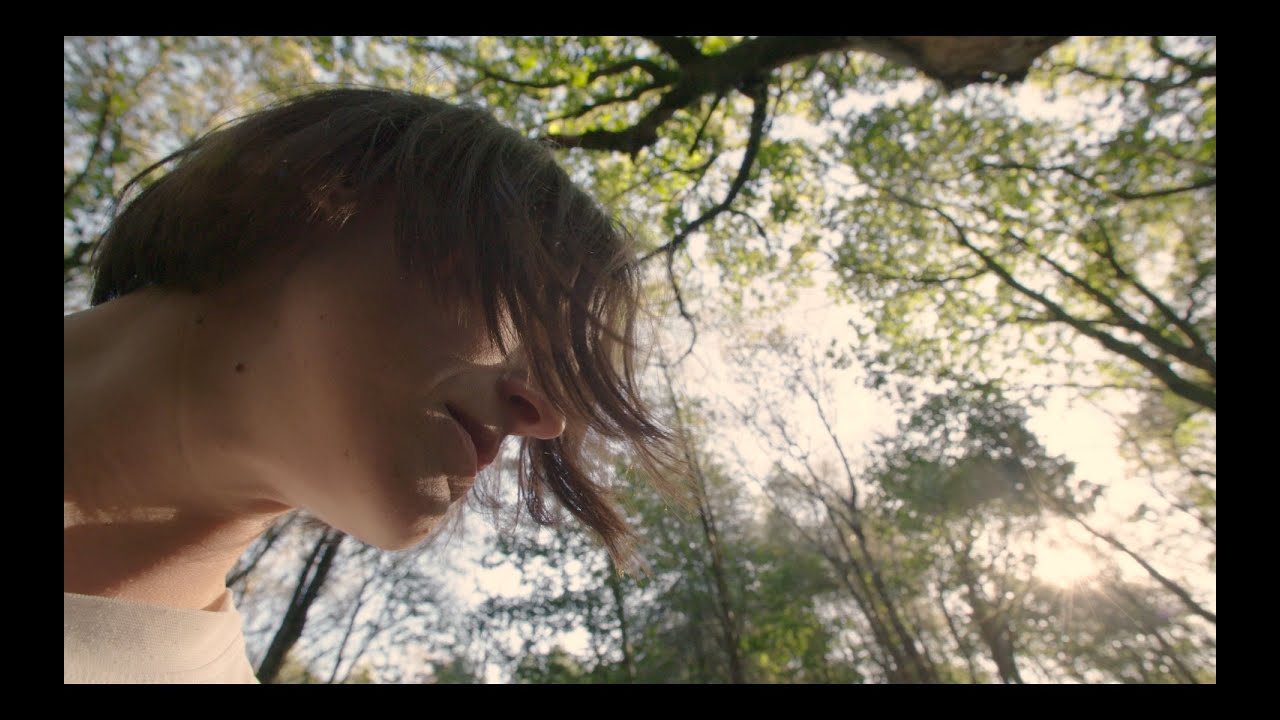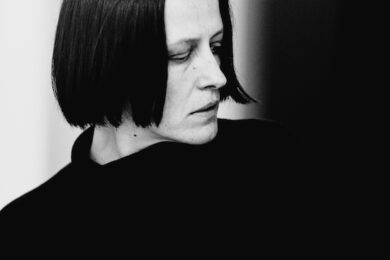Portraits by Maria Alzamora
It has become something of a cliché to claim that art has been inspired by profound personal turmoil. A convenient hook to hang a narrative thread on, as appealing to journalists as much as fans. And yet that idea – that feeling sad makes us more creative – persists, continuing to shape much of modern culture. Keeley Forsyth though, disagrees.
“I’ve always been against that perception, that there has to be darkness for you to create,” she says from her home in Harrogate. “That’s just who we are outside the ego.”
She should know. Her debut album, Debris is a brooding, melancholic listen, full of gut-wrenching lines that hit like “blocks of metal that drop from the sky” – the turn of phrase she herself uses to describe these songs. Ghostly and fragile, they document a time when Forsyth felt “lost”, when life had become “heavy and hard”. “Let the shadows come and wash away the tears”, she sings on ‘Black Bull’; "Is this the remarkable point of no return?" she asks on ‘Start Again’.
But, as Forsyth is at pains to point out, such turbulent thoughts weren’t a response to anything external; they simply lie deep within us all, dormant, waiting to be confronted. “It is true of all us, that sense of madness,” she says. “I just call it being human.”
Born and raised in Oldham, Forsyth is known primarily as an actor, having starred in a number of acclaimed feature films and TV series over the last twenty years. Yet music has been a constant throughout her life, something she’s always dabbled in but kept relatively private – she sat on the songs that would become Debris for a number of years, only deciding to release them after she heard pianist and composer Matthew Bourne’s work on the radio, and asked him to collaborate.
An instinctive, singular performer and writer, she says some songs simply poured out, needing little in the way of embellishment. There’s more than a hint of auto-fiction too; Forsyth talks of the “singer” on Debris being an entirely separate character, albeit one wrestling with precisely the same issues and experiences as herself (loss, trauma, the mundanity of everyday life).
Such themes will also be prominent in her shows planned for 2020, more a full length, immersive production than anything resembling a traditional concert. Unique is what she’s aiming for; confrontational too. Much like Debris, it won’t make for particularly easy listening or viewing, but that’s entirely the point; Forsyth’s work demands undivided attention, offering rich rewards to those who oblige.
You have such a distinctive singing voice. Is that something you cultivated, or does it just come naturally?
Keeley Forsyth: I trained as a dancer, but I was also very aware – not that I could sing – that there was something about the voice that I really loved. So the singing was always there, right from the beginning, but I never connected the two – the voice and the physical.
It was only as I got older that I started to use my body as a way to sing. It sounds really pretentious, but I think my body became the first instrument; the physical aspects of how I felt became vocalised. The songs I used to make were more like shanty songs or something akin to that, just a drone on a harmonium or accordion. Just something that I could put my feet onto, as a physical anchor. Now, it sounds exactly how I want it to sound.

The description of your voice in the press release – “the bastard love child of Peggy Lee and Nico” – is pretty accurate. It also reminds me of ANOHNI.
KF: Even my speaking voice has always been kind of quite low, but the vibrato was just there, right from the beginning. I did have training in opera stuff sporadically over the years because at one point, I wanted to go down a more classical route. But I don’t consciously think about it – I’m not trying to make a sound that sounds perfect anymore.
You’ve said that the “singer” on the album is not really you – it’s a different person, a character.
KF: The album is about a certain experience, and I don’t talk of myself singing it; there is a singer that is separate to me. It allows me to let go of any preconceptions I have about how the music should sound, how my voice should sound, and it becomes more of a channelling thing; more of a feeling of being possessed. I’m making new stuff at the moment, and the singer has a slight, almost foreign, accent, and I just have to go with it.
But my intention was not to make an album, or make some music for it to be listened to. It’s an experience that one has, and this is how the experience sounds. That’s it really.
What was the catalyst for chronicling this experience then?
KF: I was trying to gain some recognition within my life because I was losing everything. Not from a material point of view, but from a spiritual point of view, and [the album] became the place where I could understand what was going on because I could have a dialogue with myself. Some of the songs took as long to write as it does to sing them; they just kind of started and finished, and that was the song done. And with that, I could understand how I was feeling in my own life. It was done out of a sense of suffering really – it’s a necessity that I’m grateful to have.
What drives people to create as a reaction to such suffering or dark times?
KF: It’s interesting because I’ve always been against that perception, that there has to be darkness for you to create. For me, when there was a breakdown of everything else, it’s not that this stuff came out of it, it’s just that that’s what was underneath it all.
A lot of artists say this inescapable urge to create, to work through whatever problems they have in their art, is cathartic and really helped them. Is it the same for you?
KF: No one else in my family makes music or art, but they all have their own way of expression, they all have their way of surviving; they still get through stuff. And they go through horrendous things. But my music comes from a place where I feel that I can shut off. I don’t really meditate, but this is what it is for me because I can focus in on that space within yourself, the one people go to when they meditate. And that’s why it’s not me singing, because I’m not fully conscious when I’m doing it.
When I’ve finished singing or recording, I feel so much better because there’s a voice within me that I’ve allowed to come out. That’s why when I’m performing, some of the noises that I make are just not nice. But it’s about giving voice to that thing that otherwise might turn against me and send me crazy. So I don’t consciously write songs as therapy, but I completely understand how some people do.
It feels like the opening of ‘Lost’ – “Is this what madness feels like?” – is one of the key lines on the whole album. Did that come from a particular low point?
KF: You know, I do think that the album has a narrative of truth, untruth, death, and truth again, but I’m always reluctant to call anything a low or high point. Like anyone, there has been suffering – and madness too – but I completely accept that; it is what it is.
When I first heard it [that song], I felt a bit shaken because it sticks in your throat. It’s really hard. But I wouldn’t call the place she sings about a low point; I would just call it being human. And I never want to go there ever, ever again.
That idea – that we are only human – is repeated in ‘Look To Yourself’. What is it to be human then?
KF: I made that song when my children were in bed, and I was trying to keep them settled; it’s a desire for them to have the skill of settling themselves. This is one of the few songs where it’s not someone else who sang it; this is me singing. I connect to this.
It’s more of a lullaby, of saying: “Look to yourself, and you will know." In a sense, it’s about self-forgiveness – I know my own failings, and it’s not about trying to excuse them, but asking for forgiveness from my children. But it’s also to say: “It’s not that I am only human, we are only human. You will feel these things too.” And that’s ok.
When you have been through something like what’s described in ‘Lost’, boundaries break down. You can see the whole picture, and you can see it for what it is – it’s nothing extraordinary; it’s just a sense of being human. Nothing more and nothing less.
What happens to someone’s art when the personal suffering or dark times pass? Does it affect the urge to create?
KF: But that’s exactly that sense of being human. I was reading something in the paper this morning and another human is going through dark times, and therefore it is my responsibility to respond to that. Darkness is part of our DNA and I will never abandon my fellow humans. I’ll always feel the need to sing about what is there, whether I personally feel it or not. I’m in a very different place now, but in a way it’s easy for me to connect to that because I’m more fluid, I’m not like that hard “block of metal” I’ve talked about. Really, darkness and light are just another form of breathing in and out, and I’ll always be a part of that.
There’s a dramatic, melancholic air to the music and lyrics on Debris, but I can also hear hope; in the string arrangements and, in some places, in your voice. Does art always needs that chink of light, the sense all is not lost? Is that what helps art connect with people?
KF: I think it will always have that streak to it. I wasn’t consciously thinking it has to be about hope, because some people don’t always get to that point, you know? I never liked that idea of: “Oh, I was there, but now I’m here.” It just feels awful to me to assume there’s one place that’s better than the other, and that hope is better than darkness.
You mean in the sense of going on a personal journey?
KF: Yeah. There are some people who don’t ever live that hope. Do we therefore say: “Oh, you never quite completed your journey?” But I think maybe the hope comes through because the guy I make music with, who put the strings on it – Matthew Bourne – that’s his collaboration. He makes the singer more human. Matthew brought the hope; I know nothing of hope. That’s what we do for each other.
You’re working with a choreographer for shows planned for later in 2020. Given that you’re inhabiting a character in this music, is that going to be reflected in how you do this live?
KF: I’m hoping that we can make a proper theatre show; an hour and half long, a stand-alone thing with some dialogue in it, in between songs. It’s the same character that I will be playing – at the start she crawls on the stage – and there’ll be no chat, like: “This is my last song!”
I’m also working with Maxine Peake, and we’ve been talking a lot about the repression of the female voice. It’ll be the music from Debris, but we’re going to do some kind of drama within it; no one gets any light relief. I want other people to go through the same trauma that I felt, so the performance part of it will be like the record, but times ten. It’s more abstract, and it’s a very physical performance. The album was kind of a stepping stone to this point really.
There’s an interesting space between what we might call a traditional concert, and more immersive, theatrical performances. Not least from the audience perspective, and what they expect.
KF: I’ve had twenty years working as an actor in theatre and on film, so in a way, that’s where my mindset is; I make music for that. It’s too different an area for me to adjust myself to, so all I’m doing is bringing my twenty years of experience and making a production.
I don’t go to a lot of gigs; I don’t even know a lot of music! So I haven’t been influenced by that. I don’t know how people are in concerts. I’ve been to a few, but what I experience – I go to Sadler’s Wells, I’m a huge fan of Pina Bausch, the German choreographer – is very different. But that’s my visual idea of how to make music work on that platform. My head just goes that way, and it’s because of my background.
Debris is released on January 17 via Leaf Label. Keeley Forsyth will play YES (The Basement) in Manchester on 28 January, and The Islington, London, on 29 January




